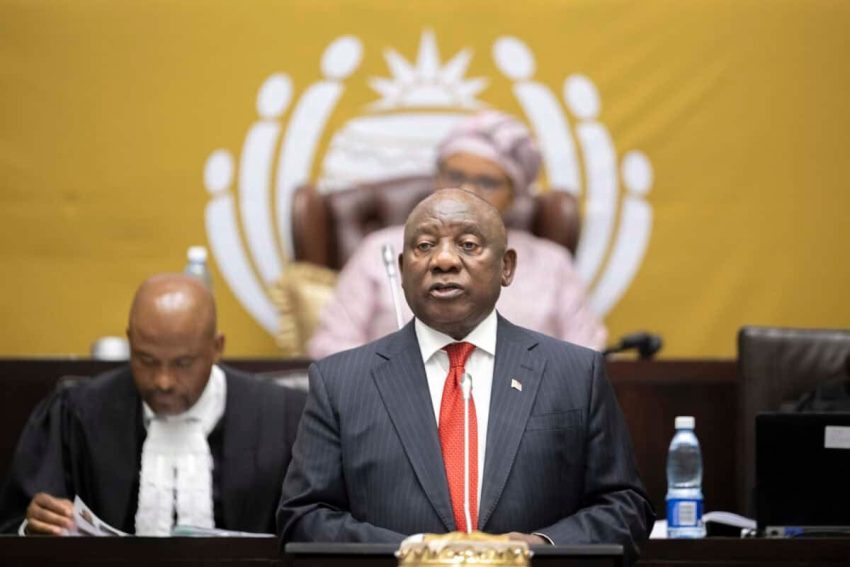Ramaphosa says South Africa negotiates from strength, not weakness, dismissing Malema’s claim the country is “crawling” to appease the US.
President Cyril Ramaphosa has rejected claims made by EFF leader Julius Malema that South Africa is “crawling on the floor and begging” to appease the United States (US) rather than imposing retaliatory tariffs.
The president said this after Malema asked about the government’s response to the 30% tariffs imposed by US President Donald Trump on South African products.
Ramaphosa was responding to oral questions from members of the National Assembly on Tuesday. Parliament holds oral question-and-answer sessions with the president at least once every quarter.
SA negotiates from strength, not weakness — Ramaphosa
Ramaphosa stressed the importance of strategic engagement with the US to secure mutually beneficial outcomes.
He said the government is leveraging South Africa’s natural resources, such as critical minerals, in negotiations with the US.
The goal is to continue exporting to the US while encouraging US companies to invest in the country, Ramaphosa said.
ALSO READ: MK party files complaint against Ramaphosa and Steenhuisen after Trump meeting
“We’re involved in various visits to other countries; trade missions, if you like. The deputy president and ministers are scouring the world, going place to place, country to country, seeking to open channels and markets for our South African products,” he added.
‘You have juniorised the country’ — Malema
In a supplementary question, Malema accused the president of making South Africa look like it was “crawling on the floor and begging”, which, he said, reduced the country to a junior partner of the US.
“You have juniorised the country, and it has lost its status globally,” Malema said while asking why South Africa has not imposed retaliatory tariffs like China, Canada and the European Union (EU).
The president explained that the government has chosen to engage in negotiations with the US rather than retaliate. Ramaphosa countered that the government’s response draws on consultations with the private sector and unions.
“It’s all very well to say what we should have done, whether it is to retaliate. In retaliation, you’ve got to be absolutely clear whether you will be able to achieve precisely what you need to achieve,” he said.
“We believe that we are on the right course that should end up with a mutually beneficial outcome.”
ALSO READ: US sees G20 as an ‘irrelevant talking club’ – expert
He insisted that South Africa has never negotiated on “bended knee” and vowed the country would not be bullied.
“We stand as a sovereign country and negotiate and get the best deal for South Africa,” he said.
Last month, the head of the South African National Defence Force (SANDF), General Rudzani Maphwanya, visited Iran and is said to have made remarks endorsing closer military cooperation with Tehran and denouncing Israel’s conduct in Gaza.
Watch the president respond to questions in Parliament here:
According to Ramaphosa’s office, Maphwanya’s trip to Iran was not approved or communicated to the president.
At the time, Presidency spokesperson Vincent Magwenya said the president and Maphwanya would meet to discuss his remarks.
ALSO READ: Brics leaders slam US tariff ‘blackmail’ as Ramaphosa warns of hardship
During the Q&A session, Build One South Africa (Bosa) leader Mmusi Maimane asked Ramaphosa if South Africa has military operations in Iran and whether this has impacted the US tariffs.
The president clarified that the country does not have operations with Iran. The president added that Maphwanya’s visit was predetermined and not meant to affect relations with the US.
Ramaphosa emphasised that South Africa’s foreign policy is principle-driven and aims to achieve peaceful outcomes in conflicts.
SA has no military operations in Iran — Ramaphosa
“Our principles are to make peace and to make sure that there is peace in the world and all conflicts are resolved peacefully. Our standing as a country has been greatly enhanced, much as others say our standing has been dashed,” he said.
The president said South Africa continues to engage with countries like Russia and Iran to maintain peaceful relations and resolve conflicts.
Chief Whip for Action SA Athol Trollip introduced the motion to approve a constitutional amendment bill to abolish the position of deputy ministers.
ALSO READ: ‘SA must build a society in which corruption cannot take root’
“Whether, given that the republic’s 42 deputy ministers cost the fiscus R287 million in salaries, R135 million in travel and millions more in VIP protection and housing, despite holding no executive authority and, as in the case surrounding the minister of police, being unable even to act in his absence, the Cabinet intends to approve a Constitutional Amendment Bill to abolish the position of deputy ministers,” Trollip said.
He questioned their priority given to patronage over the needs of the unemployed, hungry and hopeless.
Ramaphosa defended the role of deputy ministers, stating their importance in assisting ministers and their accountability to Parliament.
In defence of deputy ministers
The president acknowledged the desire for a small executive but explained the necessity of maintaining the current structure due to the need for inclusivity in the government of national unity (GNU).
In his supplementary question, Trollip criticised the growth of the cabinet and questioned the addition of GNU positions, accusing the president of not cutting ANC positions.
Ramaphosa emphasised that the outcome of the election necessitated the need for a representative GNU. He also praised the contributions of deputy ministers and their effective collaboration with ministers.
NOW READ: Mashatile urges police officers not to surrender to any form of criminality
